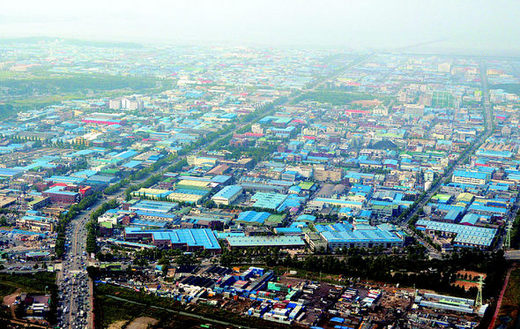 |
|
Namdong Industrial Complex in Incheon
|
Electronics industry only exception
Investment by South Korea’s top 100 companies has been slowly rising since hitting a low in 2003, but employment has not caught up, according to a recent survey. The gap between investment and hiring has become especially pronounced in the steel, shipbuilding, and chemical industries, while the electronics industry has seen a hiring boom to match its increase in investment. According to The Hankyoreh’s survey of spending and employment data at the nation’s 100 largest companies over the past five years, investment grew 26.7 percent in 2004 before surging to 32-percent and 13.4-percent increases year-on-year in 2005 and 2006. However, employment grew only 0.1 percent, 5 percent, and 4.9 percent, respectively, during the same years. The report said that the growth of investment and employment has come largely from the electronics industry, including Samsung Electronics Co. Between 2003 and 2005, this industry saw investment and hiring grow 45.9 percent and 15.4 percent, respectively. In contrast, investment by 92 companies in other sectors grew only 9.6 percent in 2003, 23.5 percent in 2004, and 8 percent last year. Their hiring, in contrast, dropped 1.8 percent in 2003 before recovering slightly to 2.7 percent in 2004 and 0.5 percent in 2005, the report showed. "As a whole, investment and hiring by companies have grown to some extent, but except in the electronics sector, the figures remain low," said Lim Kyeonng-muk, a researcher at the Korea Development Institute.Increased investment in the steel, shipbuilding, and chemical industries has especially failed to lead to a rise in hiring. POSCO and other steelmakers saw their investment expand 142.7 percent and 26.7 percent, respectively, in the past two years but their hiring level actually decreased 1 percent and 2.5 percent during the same years. Similar figures hold true for shipbuilding companies, the report showed. "Traditional manufacturers have to compete with their Chinese counterparts, so they are forced to make decisions on ’labor-saving’ investment such as automating their processes." said Kim Yong-seong, another researcher at the institute. "Therefore, the link between investment and employment has become weaker than before." Figures for communications and food companies are no better. Investment by communications firms have been on a decline for the past three consecutive years, with hiring remaining flat. Food companies saw their investment increase over 20 percent between 2004 and 2005, but hiring decreased by 1.5 percent during the same period. According to a report by the Bank of Korea, the "employment-inducement index," which compares investment levels to rates of hiring, dropped to 20.3 in 1995 from 27.8 five years earlier, and further decreased to 16.1 in 2000. At this rate, the index, which is released every five years, will likely see further decrease for 2005’s figures. "At a time when employment has hit its ceiling in the manufacturing sectors, efforts should be made in creating more jobs in the service sectors," Kim said.





